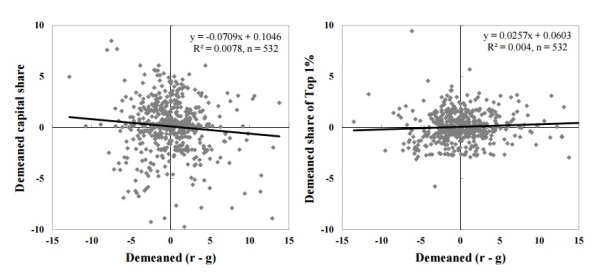I’m sometimes guilty of repeating myself. I write over and over again on topics such as the flat tax and spending caps (and don’t forget my Golden Rule!), though I hope each time I bring something new to the discussion.
Another issue that motivates me is the debate about inequality, redistribution, and growth. I get all agitated and can’t resist trying to debunk statist claims that we should focus on re-slicing the pie rather than expanding the pie.
Here are just a few examples.
- If We Care about the Less Fortunate, Focus on Growth Rather than Redistribution
- Worried about Inequality? Then Focus on Helping the Poor, not Punishing the Rich
- What’s Better for Poor People, Economic Growth or Redistribution?
- Help the Poor by Focusing on Growth rather than Inequality
- A Case Study of Why Growth Trumps Inequality
- Whether Looking at Policy or Politics, Growth Trumps Fairness
- Inequality, Redistribution, and Class Warfare
The invaluable Scott Winship makes the same argument in the Washington Post, but does it much better.
He starts with some very solid observations about
Changes to the tax code certainly could reduce inequality, but the real question is whether we should try to reduce it. There is little evidence that we should. …Across developed countries, those with higher inequality have slightly higher middle-class incomes and less poverty. …Areas of the United States with more income concentration at the top have no worse mobility than areas with low inequality. The same is true across countries — the best research indicates that low-inequality Sweden is no more mobile than the United States. …studies by experts including Thomas Piketty and Emmanuel Saez indicate that countries with higher inequality growth tend to have higher economic growth too. …Prioritizing inequality betrays indifference to policy outcomes and pure antipathy toward top earners.
And he then pivots and spends some time explaining why the focus should be on growth (assuming, of course, that the goal is actually to improve the lives of poor people rather than merely to punish the rich).
…nothing helps the poor and middle class like economic growth, and that is best pursued by policy reforms that ignore inequality. To promote growth, the next president should abolish corporate taxes and reform individual taxes… She should promote state and local reform of occupational licensing and land-use regulation. She should reform entitlements, including Obamacare, and reorient immigration policy in favor of admitting more higher-skilled and less lower-skilled immigrants. She should pursue a deregulatory agenda… Unfortunately, the distraction of inequality — or nationalism — makes it unlikely the next president will pursue any of these policies, and the poor and middle class will be worse off for it.
At this point, I imagine that some of my statist friends are sputtering and stammering to themselves about the new narrative, very popular on the left, about inequality harming growth.
I’ve already exposed the very shoddy attempts by political types at the OECD and IMF to push this ideologically-based talking point.
But what about the supposedly path-breaking work of Thomas Piketty? Didn’t he somehow produce game-changing data in support of higher taxes and more redistribution?
 Nope. He basically showed that rich people are rich, which isn’t a stunning revelation. More controversially, he wanted people to conclude that rich people being rich somehow caused poor people to be poor.
Nope. He basically showed that rich people are rich, which isn’t a stunning revelation. More controversially, he wanted people to conclude that rich people being rich somehow caused poor people to be poor.
And the theory he concocted to ostensibly “prove” his argument is so outlandish (basically assuming the return on investment is always greater than the underlying rate of growth) that only 2 percent-3 percent of economists are willing to “agree” or “strongly agree” with his premise.
For those who care more about empirical data rather than theory, you may be interested in a new working paper from one of the professional economists at the IMF. Carlos Góes finds that there’s no evidence for Piketty’s hypothesis.
Piketty…argues that all other things constant, whenever the difference between the returns on capital (r) and the output growth rate (g) increases, the share of capital in national income increases. Furthermore, since capital income tends to be more unequally distributed than labor income, an increase of the capital share would likely lead to increased overall income (and, over time, wealth) inequality. …I find no empirical evidence that the dynamics move in the way Piketty suggests. In fact, for at least 75% of the countries examined, inequality responds negatively to r − g shocks, which is in line with previous single-equation estimates by Acemoglu and Robinson (2015). The results also suggest that changes in the savings rate, which Piketty takes as relatively stable over time, are likely to offset most of the impact of r − g shocks on the capital share of the national income. Thus, it provides empirical evidence to the model developed by Krusell and A. Smith (2015), who say Piketty relies on flawed theory of savings. The conclusions are robust to alternative estimates of r − g and to the exclusion or inclusion of tax rates in the calculation of the real return on capital. …Figure 2 plots the contemporaneous correlations between r−g spreads and capital share, and share of the top 1%. Such basic correlations show no evidence of the relationship Piketty poses.
And here is the aforementioned Figure 2, with the capital share shown on the left and the share of the top 1 percent on the right.

For those who don’t like a lot of economic jargon (or don’t like looking at eye-glazing charts), here’s how the study was summarized in a report for the Wall Street Journal.
Mr. Piketty hypothesized that income inequality has risen because returns on capital—such as profits, interest and rent that are more gleanings of the rich than the poor—outpaced economic growth. …But Mr. Piketty’s thesis, posed by the French economist in his controversial 2013 tome “Capital in the Twenty-First Century,” isn’t proved by historical data, says International Monetary Fund economist Carlos Góes. …“While rich in data, the book provides no formal empirical testing for its theoretical causal chain.” Mr. Góes tested the thesis against three decades of data from 19 advanced economies. “I find no empirical evidence that dynamics move in the way Piketty suggests.” In fact, for three-quarters of the countries he studied, inequality actually fell when capital returns accelerated faster than output. Those findings support previous work by Daron Acemoglu of the Massachusetts Institute of Technology and political scientist James Robinson, now of the University of Chicago, suggesting Mr. Piketty’s thesis was far too simplistic… Why does all this matter? Because if policy makers seeking to address inequalities misunderstand the problem, their solutions could be wrong, ineffective and costly. Based on his inequality theory, Mr. Piketty has proposed progressive wealth taxes, a measure some economists argue could harm economic growth.
Amen. You don’t make poor people rich by trying to make rich people poor.
Unfortunately, I suspect (as Margaret Thatcher sagely observed) that a lot of leftists are more motivated by animus against success than they are about genuine concern for the poor.
That being said, some people do benefit from the pursuit of class-warfare policy.The College Fix discusses a new report about how some of the people who advocate higher taxes and more redistribution have figured out how to redistribute big chunks of money from taxpayers to themselves.
Several UC Berkeley economics professors who support “income inequality” research each earn more than $300,000 a year, putting them in the top 2 percent of the public university’s salary distribution, according to a recent report by a nonpartisan California think tank. …Cal’s equitable growth center’s director, economics Professor Emmanuel Saez, earned an annual salary of just under $350,000. The center’s three advisory board members – all economics professors – made similar amounts: Professor David Card made $336,367 in 2014; Professor Gerard Roland took in $304,608; and Professor Alan Auerbach earned $291,782. That’s not even including their pensions — equal to 2.5 percent times their final average salary times the number of years employed. …Another vocal income inequality expert at UC Berkeley, Professor Robert Reich – former secretary of labor under Bill Clinton’s administration who in 2013 helped produce the film “Inequality for All” – earned $263,592 in 2014, the think tank’s report states.
The article closes with a suggestion that I think will fall upon deaf ears.
…the report concluded. “So if UC Berkeley economists are really opposed to income inequality and are concerned about low-paid workers, they might consider sharing some of their compensation with the teaching assistants, graders, readers and administrative staff at the bottom of Cal’s income distribution.”
By the way, I strongly suspect that Thomas Piketty hasn’t given away all the money he earned from the infamous book he produced in defense of class warfare. Shouldn’t he lead by example?

